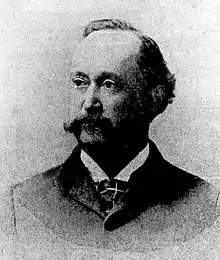Jones S. Hamilton
Jones Stewart Hamilton (April 19, 1833 – January 21, 1907) was an American sheriff, state senator, businessman and Confederate veteran who became a millionaire through investments in railroads run by convicts he leased after the war. His mansion is the namesake of Belhaven University.
Jones Stewart Hamilton | |
|---|---|
 | |
| Mississippi State Senator | |
| In office 1884–1888 | |
| Personal details | |
| Born | April 19, 1833 Wilkinson County, Mississippi, U.S. |
| Died | January 21, 1907 (aged 73) Jackson, Mississippi, U.S. |
| Nationality | American |
| Spouse(s) | Caroline Augusta Stewart Fannie Buck |
| Children | 5 sons, 2 daughters |
| Parents | William Hamilton Eliza Stewart |
| Residence | Belhaven |
| Alma mater | Centenary College of Louisiana at Jackson |
| Occupation | Businessman |
| Military career | |
| Allegiance | |
| Service/ | |
| Years of service | 1861–1865 |
| Rank | |
| Unit | |
Early life
Jones S. Hamilton was born on April 19, 1833 in Wilkinson County, Mississippi.[2] His parents were William Hamilton and Eliza Stewart, and he was of Scottish descent.[2] He graduated from Centenary College in Jackson, Louisiana.[2]
Career
Hamilton began his career as the sheriff of Wilkinson County from 1854 to 1858.[2] He served in the Confederate States Army during the American Civil War.[3]
Hamilton made money through convict leasing after the war.[3] According to the Arkansas Gazette, "As lessee of state penitentiary for years he was identified with many public works."[4] He "owned the Jackson gas works, a race track, and a number of hotels."[3] He was also a publisher of The Clarion Ledger in 1865–1867, and a co-founder of the Gulf and Ship Island Railroad in the early 1880s.[2] He became a millionaire through his investments in railroads, which were run by the convicts he leased.[3] As a result, he has been described as a "southern-style robber baron."[5]
Hamilton was criticized for his use of convict leasing by Roderick Gambrell, a newspaper editor.[3] On May 5, 1887, the two men fought it out in a duel by gunfire, leading to Gambrell's death.[3][2] Even though duels were illegal in Mississippi, Hamilton was declared "not guilty" on April 9, 1888.[2]
Hamilton served as a member of the Mississippi State Senate, representing Hinds County from 1884 to 1888.[2][6]
Personal life, death and legacy
Hamilton married Caroline Augusta Stewart in 1856 and they had a son and a daughter. His wife died in 1861.[2] He married his second wife, Fannie Buck, in 1877; they had four sons and a daughter.[2]
Hamilton died on January 21, 1907 in Jackson, Mississippi.[2][7] He donated his Jackson mansion, Belhaven, to Belhaven College (now known as Belhaven University); the mansion burnt down in 1895 but the university retains its name.[2] By extension, it is also the namesake of the Belhaven Neighborhood where it was located.[8]
References
- Rowland, Dunbar (1907). Mississippi: Comprising Sketches of Towns, Events, Institutions, and Persons, Arranged in Cyclopedic Form, Volume 3. Atlanta: Southern Historical Publishing Association. p. 311.
- "Collection Title: Hamilton (Jones S.) Pamphlet". McCain Library and Archives. University of Southern Mississippi. Archived from the original on 2015-09-05. Retrieved November 2, 2017.
- Olinsky, David M. (1997). Worse Than Slavery: Parchman Farm and the Ordeal of Jim Crow Justice. New York: Simon and Schuster. pp. 43–50. ISBN 9780684822983. OCLC 36812900.
- "COL. JAMES S. HAMILTON". Daily Arkansas Gazette. Little Rock, Arkansas. September 21, 1907. Retrieved November 2, 2017 – via Newspapers.com.
- Adamson, Christopher R. (June 1983). "Punishment after Slavery: Southern State Penal Systems, 1865–1890". Social Problems. 30 (5): 555–569. doi:10.2307/800272. JSTOR 800272.
- "COL. J.S. HAMILTON DANGEROUSLY ILL". Vicksburg Evening Post. Vicksburg, Mississippi. January 19, 1907. p. 1. Retrieved November 2, 2017 – via Newspapers.com.
- "Col. Jones S. Hamilton". Natchez Democrat. Natchez, Mississippi. January 22, 1907. p. 2. Retrieved November 1, 2017 – via Newspapers.com.
- Bryant, Kimbler (March 25, 2004). "Belhaven foundation impacts area". The Northside Sun. Jackson, Mississippi. p. 8. Retrieved November 6, 2017 – via Newspapers.com.
The Greater Belhaven area takes its name from a palatial home which once stood on Boyd Street, east of Jefferson, according to the GBNF web site. The spacious colonial structure was the residence of Colonel Jones S. Hamilton, and named "Belhaven", which means beautiful house, after the Hamilton family seat in Scotland.